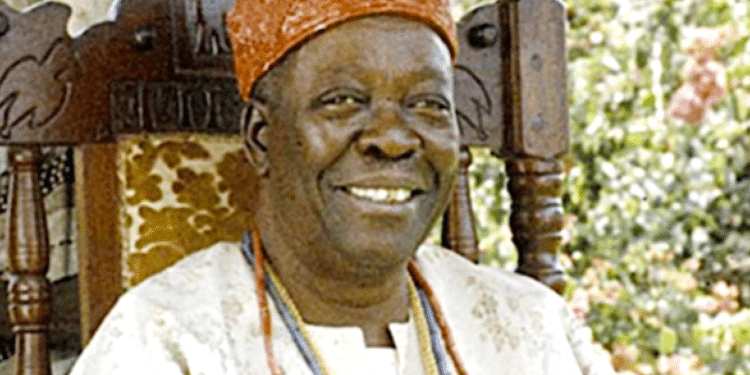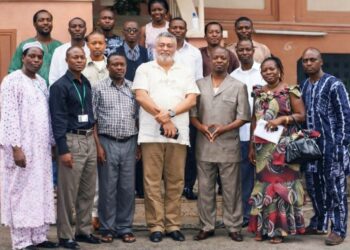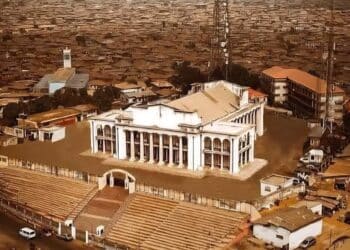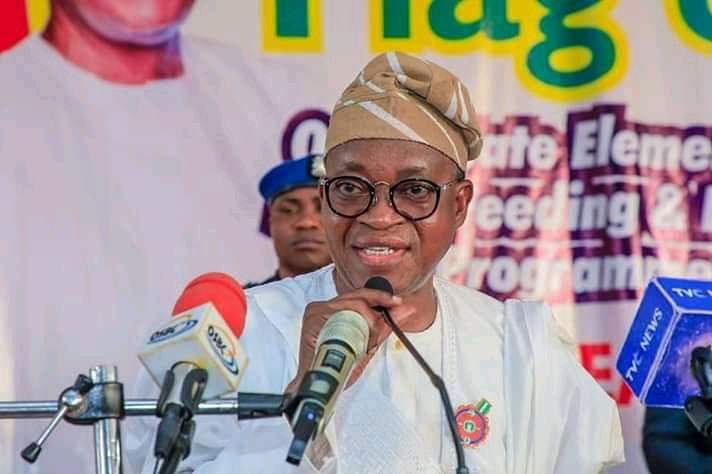Oba Adesoji Aderemi was born on November 15, 1889, during the turbulence of the Yoruba civil war, to Prince Osundeyi Gbadebo of the Osinkola ruling house of Ile Ife and Madam Adekunbi Itiola of Ipetumodu. She was his 19th and youngest wife. In the absence of his warrior father, who was on a war expedition, he was named Adesoji Aderemi, meaning “The crown has woken up” and “The crown consoles me,” respectively.
Prince Gbadebo being an Ifa priest, presented his newborn to his Ifa Oracle, demanding to know what the future holds for the new baby Aderemi. The father was told to bow to his son. The Ifa predicted that baby Aderemi was going to wear the crown of his ancestors, that his reign would be known far and wide, and that he would come into contact with strangers in faraway places.
Prince Gbadebo told his wife to get coral beads to dress his son, as was customary for royalty. In the belief of the oracle, mother-Adekunbi went into protective mode, always washing Aderemi in herbs, until he outgrew her methods. His father died in 1897 when he was 8 years old. His mother raised him because he lost his father at a young age. The emergence of Christianity dissuaded his mother from the traditional family worship of Ifa, hence his enrollment at the new local Christian primary school of St. Phillips, Ife, as one of the first students in Ife to attend a local school in 1901.
The young Prince Aderemi had a vision. His objection to farming with his much older and beloved brother, Papa Prince Adeyemo, led to his enrollment at the Anglican primary school at Aiyetoro, Ile-Ife.
Oba Adesoji Aderemi: The Journey To The Throne
Prince Aderemi’s wealth and exposure made him the clear candidate to rise to the throne of Ile-Ife. Upon the death of Oba Ademiluyi, his predecessor, he became the outstanding contestant for the throne.
On the 2nd of September, he became the 49th Ooni of Ife, at 40 years old. Oba Aderemi, dubbed the first literate Ooni, was the youngest of the Yoruba Obas at the time. Oba Aderemi with the aid of the traditional Ife elders (Obalufe, Obajio, Obaloran, Wasin, Obalaye, Akogun, Jagunosin, and Ejesi), formed the administrative set-up that transformed the ancient town in the next decade. He championed education during his reign as Ooni, which was the sentiment behind the foundation of Oduduwa College in January 1932. Oba Aderemi personally funded the construction of the secondary school, a model institution at the time, by his conviction that education is the most reliable way to promote and sustain modernization.
A great landmark of his reign in education was the foundation of the University of Ife, which many attributed to Oba Aderemi’s influence in the ruling government. The Ooni tenaciously proposed Ife as the ideal location for the foremost institution to be situated.
Oba Aderemi constructed the main building of his palace, which remains a mainstay of the Ife palace to date with its unique colonial style.
His reign as Ooni was remarkably peaceful, with his innovative ideas in business creating a pathway to wealth for a lot of self-government in the agriculture industry, where he was a business leader himself.
Oba Aderemi was thy and had a large family of many wives and children. One of his children was Tejumade Alakija (17 May 1925–August 2013), a Nigerian civil servant who rose to be the first female head of Oyo State’s civil service.
Oba the Aderemi Breaks Protocol, Dubbed As Governor In Nigeria And Across Commonwealth
During the colonial era, the Oba Ooni gained a considerable amount of power due to the colonial policy of indirect rule and being labelled a first-class Oba among traditional rulers in Yorubaland. The policy of indirect rule was used to ensure native awareness and consultations about colonial policies affecting the regions. The British leaned on existing native political structures and hierarchy, particularly the Nigerian traditional rulers, for political consultation and tax collection. Later on, the Ooni, with the consent of the leading Yoruba political leaders, used his position to close the gaps of exploitation of divisional differences among Yorubas and tried fervently to rally the Yoruba towards a common goal.
Then, the agitation for Nigeria’s independence from the British Colonial government took many dramatic turns and had many other effects, but the roles played by the different actors didn’t go unnoticed. The role played by this monarch, despite being aware that independence would limit his administrative power as a monarch, made him a great beneficiary when the demand for self-government was granted.
Oba Aderemi had an engaging personality that elevated him to the very top of society, breaking all tradition and cultural protocols to become the first and only Nigerian to be a monarch and a governor, combining traditional and political power.
As a member of the Action Group (AG), a foremost political party dominant in the Western Region under the leadership of Sage Obafemi Awolowo, Aderemi became a member of the Legislative Council of Nigeria in 1946 and was there till 1951. The monarch would later become a member of the Nigerian Federal House of Representatives as well as a minister in the Central Government from 1952–1954.
In March 1953, when Sir Anthony Enahoro moved the motion for Nigeria’s independence by 1956, the motion was opposed and defeated at the Federal House of Representatives by the Northern People’s Congress, to the delight of the British colonialists. The Action Group and the National Council of Nigeria and the Cameroons (NCNC) staged a walkout from the House and prominent figures like Oba Aderemi resigned from the Council of Ministers.
Despite overtures from the Governor-General, John McPherson, who lobbied him to see reasons why independence would not be in his interest as a monarch because it would take away his administrative powers, Aderemi chose national interest over personal aggrandizement and insisted on independence.
In July 1960, three months before Nigerian independence on October 1, 1960, Aderemi was appointed governor of the western region (which consists of the present-day Oyo, Ogun, Ondo, Osun, Ekiti, Edo and Delta states; Lagos being the seat of power and the base of the colonialists at that time was not part of the Western Region) in July 1960. He held the position till 1962.
Oba Aderemi disproved the myth that monarchs don’t engage in politics. He didn’t just hold political power, he used it well to global acclaim. He was not just a Governor-King, he was the first Black man to be appointed governor across the Commonwealth – the empire controlled by British colonialists across Africa and beyond.
In 1962, the king, acting as governor, used his power to remove the premier of the region, sensing the premier did not have the support of the majority members of the House of Assembly. The event escalated the political rivalries in the region.
Ooni Aderemi served as the permanent chairman of the Obas council from 1966 to 1980, when he joined his ancestors. The late Oba Okunade Sijuade, the Olubuse II (1980–2015), succeeded him.










